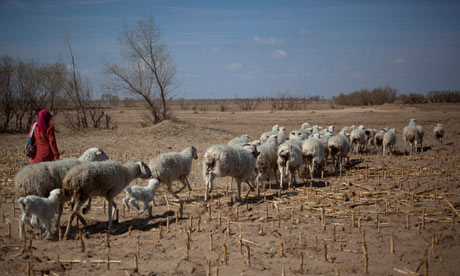Published on Mar 4, 2013
"Desertification
is a fancy word for land that is turning to desert," begins Allan
Savory in this quietly powerful talk. And terrifyingly, it's happening
to about two-thirds of the world's grasslands, accelerating climate
change and causing traditional grazing societies to descend into social
chaos. Savory has devoted his life to stopping it. He now believes --
and his work so far shows -- that a surprising factor can protect
grasslands and even reclaim degraded land that was once desert.TEDTalks is a daily video podcast of the best talks and performances from the TED Conference, where the world's leading thinkers and doers give the talk of their lives in 18 minutes (or less). Look for talks on Technology, Entertainment and Design -- plus science, business, global issues, the arts and much more.
Find closed captions and translated subtitles in many languages at http://www.ted.com/translate
Follow TED news on Twitter: http://www.twitter.com/tednews
Like TED on Facebook: https://www.facebook.com/TED
******************************************************************************
Could cows and sheep halt climate change and tackle rural poverty?
Agriculture
is destructive, but doesn't have to be. Livestock could help tackle
climate change, desertification and rural poverty

A
herder leads her sheep in search of grazing grounds in Inner Mongolia,
which is fighting severe desertification. Photograph: How Hwee Young/EPA
The use of livestock as a tool for restoration has been scoffed at by scientists, reviled by vegetarians and those who blame cows for climate change, and a flashpoint for tension over how to conserve land in the American West.
Reviving grasslands
But that was before Allan Savory, who developed holistic management, won the 2010 Buckminster Fuller Challenge for a programme with "significant potential to solve one of humanity's most pressing problems." And before governmental agencies such as USAID and large NGOs like the Nature Conservancy teamed up with the Savory Institute on international projects after seeing the benefits on the ground. And, in an era when one viral video makes the difference between anonymity and renown, before Savory's TED talk, How to Green the Desert and Reverse Climate Change, flew round the Internet with some 2m views.At the end of June, I attended the first Savory Institute International Conference, Transforming Landscapes for Global Impact, in Boulder, Colorado. This two-day event, attended by 300 ranchers, scholars and investors from around the world, showed that holistic management is now launched as a global movement – one that's positioned itself as a vehicle for addressing seemingly intractable problems of climate change, desertification, and rural poverty.
The impetus is to bolster the deployment of holistic planned grazing to revive the grasslands of the world. Grasslands, also known as prairie, savanna, steppes or pampas, represent 40% of the world's land surface. Much of this land is desertifying, or losing the capacity to sustain life; more than 10m hectares of productive land succumb to desertification every year.
Deploying cows, sheep and yaks to fight desertification
Since I began exploring soil as a crucible for our many overlapping ecological and economic crises – and for solutions - I've been intrigued by holistic management's use of the humble cow, sheep, goat or, more exotically, camel or yak to remake the land. The results are most dramatic on "brittle" landscapes, that are dry much of the year and need to sustain moisture from one rainy season to the next.Savory's insight is that grasslands and ungulates evolved together, so that the land needs animals in the same way that animals need the land. All domestic animals have an impact on land; this impact can be positive or negative, depending on how they are managed. Land can be overgrazed but it can also be undergrazed, meaning that it suffers from lack of animal impact.
This notion surprises many people, who assume that leaving land alone is always better. But when, say, cattle are moved in a planned way, their behaviour kickstarts key biological processes that might have stalled, a situation that could lead to desertification.
Read More Here
******************************************************************************








No comments:
Post a Comment
Hello and thank you for visiting my blog. Please share your thoughts and leave a comment :)